‘If Winning or Losing Is Going to Define You, You’re on a Rough Road’

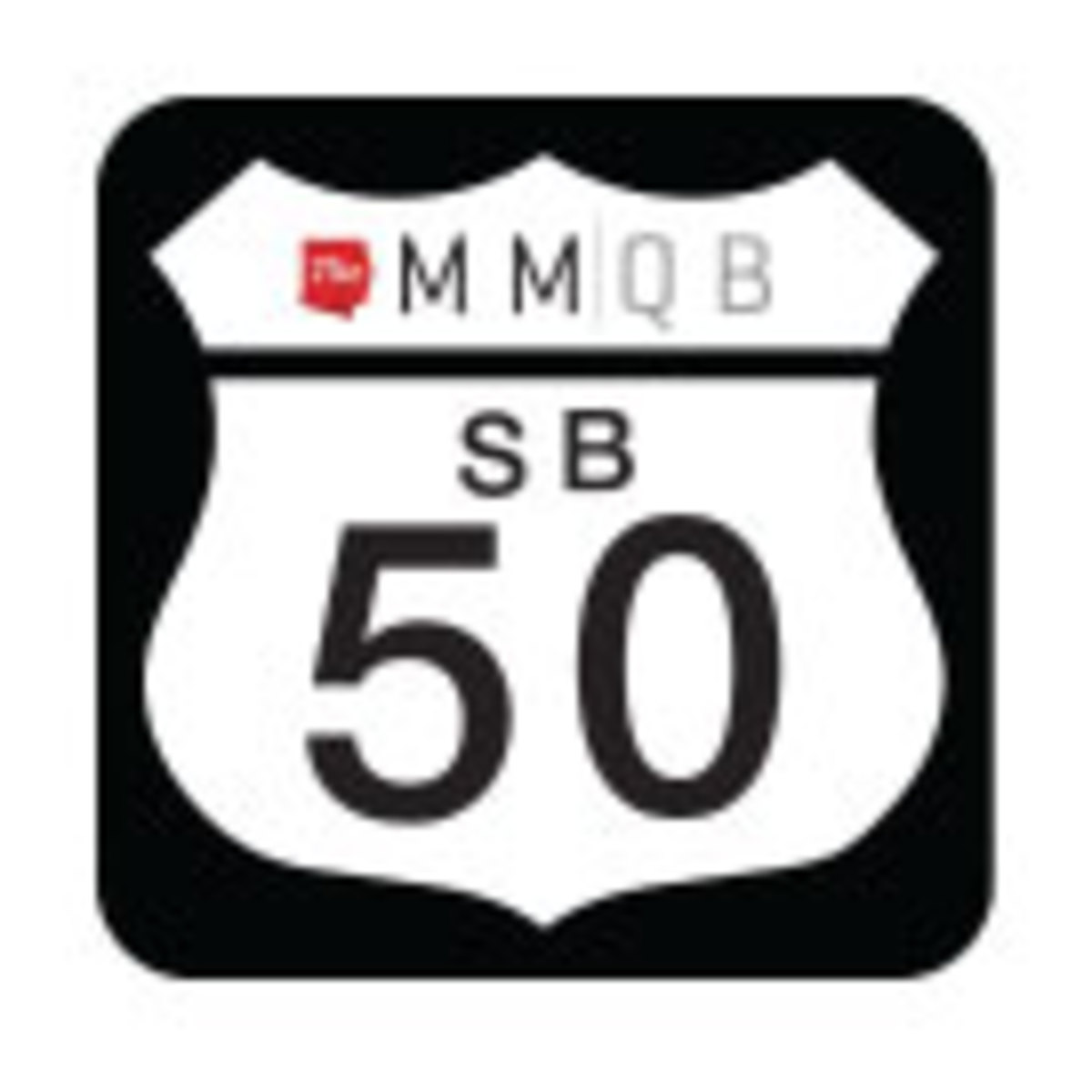
The MMQB is on the road to Super Bowl 50, telling stories of the game’s history and the Panthers-Broncos matchup, meeting notable Super Bowl figures and exploring what the game means to America, from coast to coast. Follow the journey on Twitter and Instagram (#SB50RoadTrip), as well as at The MMQB’s Facebook page, and check out our stories and video on our Road to Super Bowl 50 hub. And if you see us on the road, give a wave.
EDEN PRAIRIE, Minn. — As consultant to the Vikings, Bud Grant, the team’s 88-year-old former head coach, had some important advice for current head coach Mike Zimmer after his NFC North championship and wild-card playoff appearance: keep the expectations low.
“I told him, you have to be careful, because as you go along you’re supposed to get a little better,” Grant says, with only a hint of sarcasm. “If you had gone to the Super Bowl this year, then you have to come back next year and go to the Super Bowl again. Don’t do too much the first year or second year.”
Grant shares this advice from the seat of his office at team headquarters on a Saturday morning in January. In truth, lowered expectations have never been part of Grant’s résumé. He went on from a childhood polio diagnosis to become the only man to play in the NBA and the NFL. In 1953, he did something nearly unheard of—turn down an NFL contract for more money in the CFL.
“The Eagles offered me $8,000, and I went to Winnipeg for $11,000,” he says. “That’s not tough arithmetic!”
After he played there for four seasons, Winnipeg asked him to coach the team, and all he did was win four Grey Cups in five seasons from 1958 to ’62. Later, the Vikings’ run of four Super Bowl appearances under Grant forged his fame stateside and earned him permanent residence at the Eden Prairie headquarters.
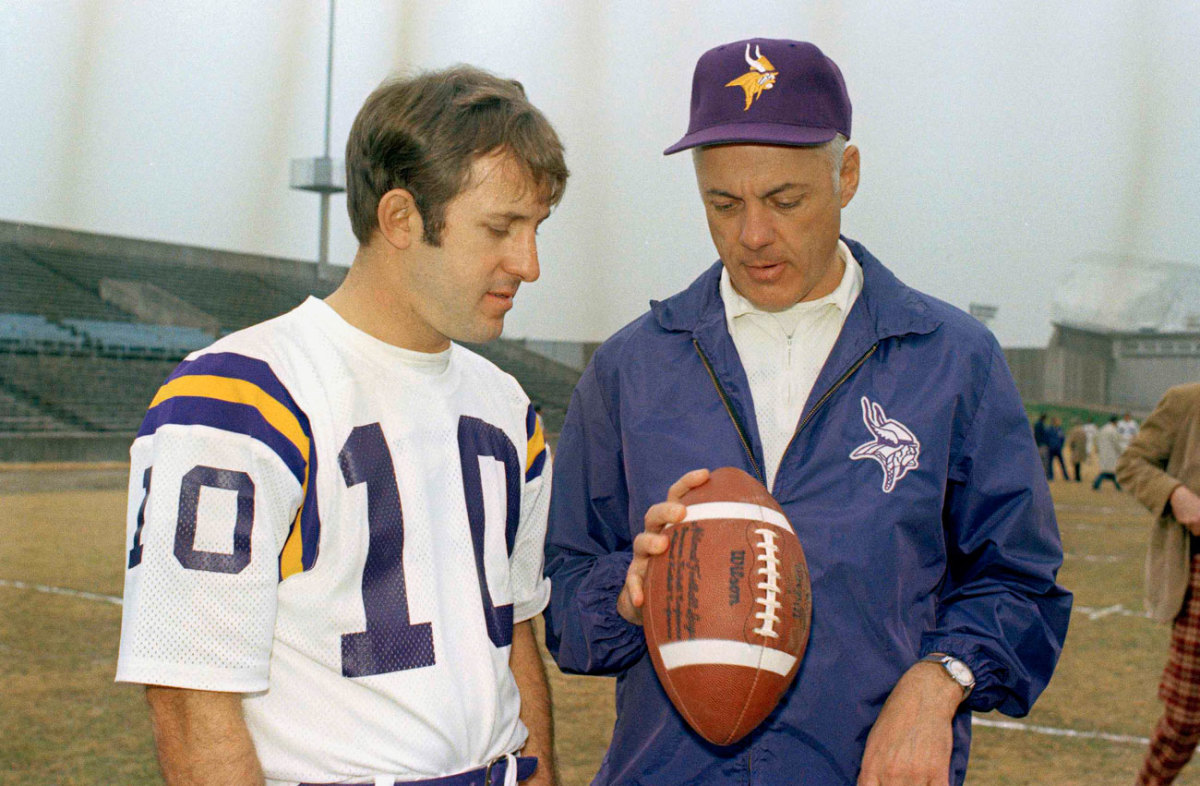
And his corner office isn’t solely a Vikings museum as you might expect. He keeps the warped leather helmet his father wore for the Duluth Eskimos in 1926. Then there’s the black-and-white portraits of the two Minneapolis Lakers clubs with which he won NBA championships. (“George Mikan was one of the greatest competitors I’ve ever been around,” he says of the bespectacled Lakers great.) His walls are covered with portraits of multiple black Labradors he’s raised over the decades, and his desk is covered with mail. One fan sent a photo from an old newspaper depicting a teenaged Grant in his American Legion baseball uniform.
“People send me that kind of stuff a lot,” he says. “It’s great.”
His office here is as thrown together as his legendary yard sales. That Grant finds nothing odd about tweeting out his address and selling off old Vikings gear at neighborly prices speaks to his lifelong irreverence to football celebrity and accomplishment.
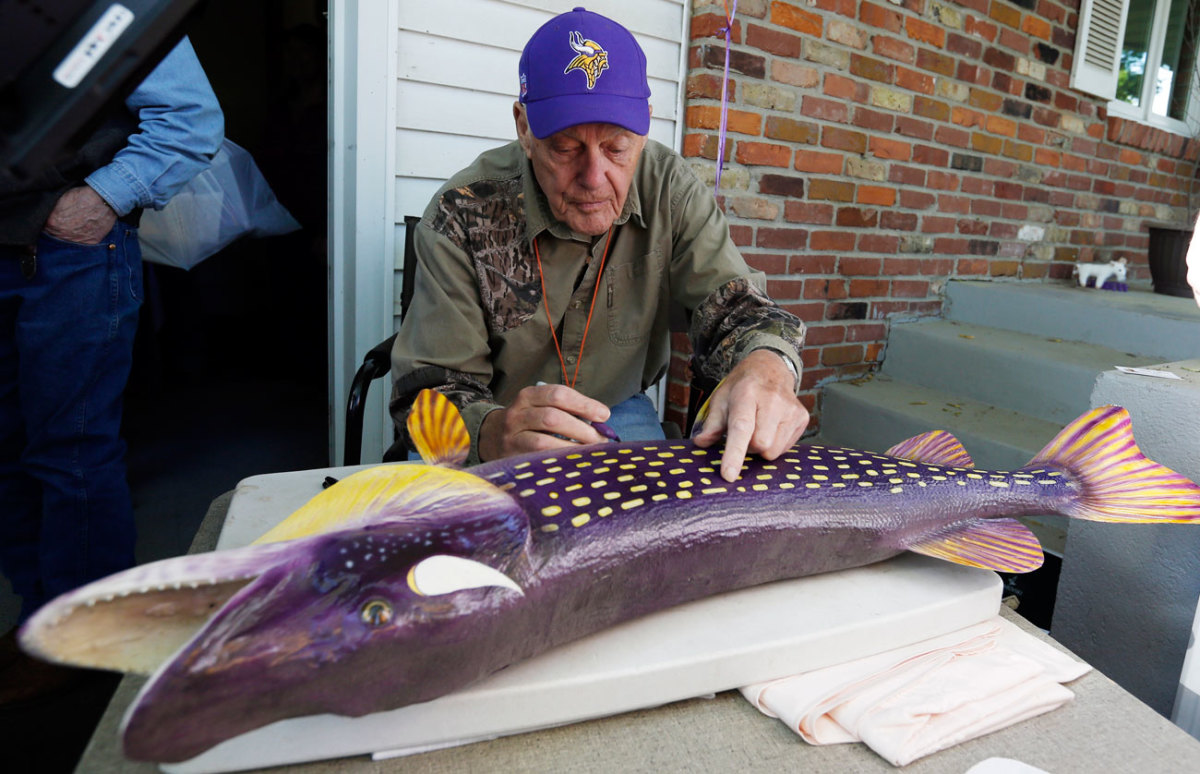
All of which brings us to those Super Bowls. Grant and former Bills coach Marv Levy have the unwelcome distinction of having gone to the most Super Bowls as a coach without winning one. At the conclusion of the ’69, ’73, ’74 and ’76 seasons the Vikings went to Super Bowls IV, VIII, IX and XI, and lost all four. That’s where our conversation with Grant started:
The MMQB: If Marv Levy hadn’t lost four Super Bowls with the Bills, your team would’ve been the NFL benchmark for almost winning it all, over and over again. Do you feel more pride in having reached four Super Bowls, or ignominy for having lost them all?
Grant: We got paid. We won. We came back, and we won again and again. But you have to remember one thing: Football is entertainment; it’s not life or death. Once the game is over, you’re already talking about next year and the draft. It’s just entertainment. It’s like going to a play: When it’s over, you walk out the door and it’s over. There are no residuals to it. You’ve got to start all over again. If winning or losing is going to define your life, you’re on a rough road.
The MMQB: Obviously the league has changed in so many ways since then. This Super Bowl would be unrecognizable, the spectacle of it, to somebody who was at Super Bowl IV. What’s the biggest difference between reaching a Super Bowl today and then?
Grant: In those days we could get a player and keep him. Now with free agency, how long are you going to keep a great player? You have to bundle them up and give them a lot of money to keep some of them, like Brady and Manning, but you can’t do that with the whole team. Now you can have a great player, but he might get more money if he played for someone else. This year probably four of the top 12 teams will drop out because they can’t retain the players. Nowadays, stars leave to go to hell for a dollar more. That’s not bad; the players benefit from that certainly.
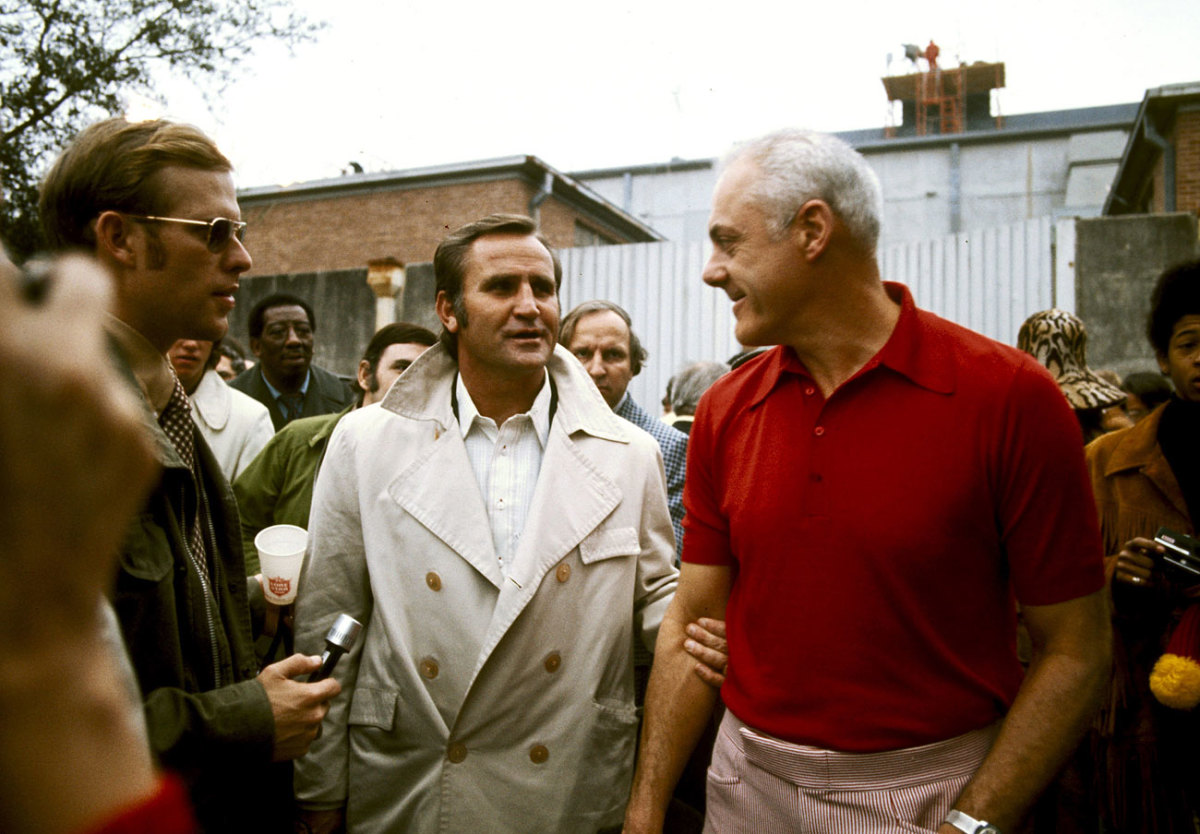
The MMQB: When those losses start to pile up, especially after you lose to the Dolphins in ’73 and the Steelers in ’74, do you start to feel like they’re connected. Does it feel like a trend?
Grant: The reason they call it the Super Bowl is because it is one game. If we played three out of five or more, like baseball and hockey and basketball, it’s different. Kansas City beat us in that Super Bowl [IV]. Next year they came here and we beat them handily. I don’t think we were that much better, but if you play a series of games, you get a much better feel. It’s just about when you’re playing your best and when you’re healthy. There’s a lot of luck going into this game.
* * *
Bud Grant is a sportsman. More specifically, Bud Grant hunts. He keeps a photo of his younger self posing behind a felled elk four times his size. He can’t be reached in the month of October, the heart of his hunting season. He doesn’t own a cell phone or have an email address, so he’s not quite privy to whichever aspect of the NFL experience social media is complaining about at the moment. What he knows is football, and entertainment.
• ROAD TO SUPER BOWL 50:Why Chicago can’t let go of the ’85 Bears | A Colts fan on why Indy is pulling for Peyton | Luke Kuechly, ‘nice boy’ to ferocious defender | Timmy Smith’s one great game, and great regret | Read the series
Several years ago Grant started beating the drum for a change in the extra point routine. “It’s a nothing play,” he told The MMQB’s Peter King in 2013. Two years later the NFL moved the extra point 13 yards back. By late September of 2015, the NFL eclipsed the 2014 total for extra points missed.
It is with this prescience in mind that we inquire as to Grant’s latest critiques of the game.
The MMQB:Give us your rule changes for 2016.
Grant: If you watch a football game, a fair catch is nothing. There’s no play. It’s nothing. Every team has enough guys that can sit down and catch the ball. Once in awhile they will drop one, but very seldom. You pay that punter to kick the ball 45 yards, and you pay that guy to catch the ball, and nothing happens, and now we go to commercial. In Canada they don’t have a fair catch. You catch the ball, and you have five yards around you where nobody can be when you catch the ball. It gives you a little start. You’d be surprised how that can help; you gain five or 10 or 15 yards. And it’s a play that people like.
The MMQB: That feels like something the NFL could realistically adopt.
Grant: Go further. What’s a kickoff now? Two commercials. If they kickoff 200 times, they probably return five. I think they could move the kickoff back further or change the rule where you have got to return the kick. Make it so if you take a touchback then you get the ball at the 10-yard line instead of the 20. So now there is an incentive to get the ball up the field and get more than the 10 yards. And make it a penalty for the kicking team to kick it out of the back of the end zone.
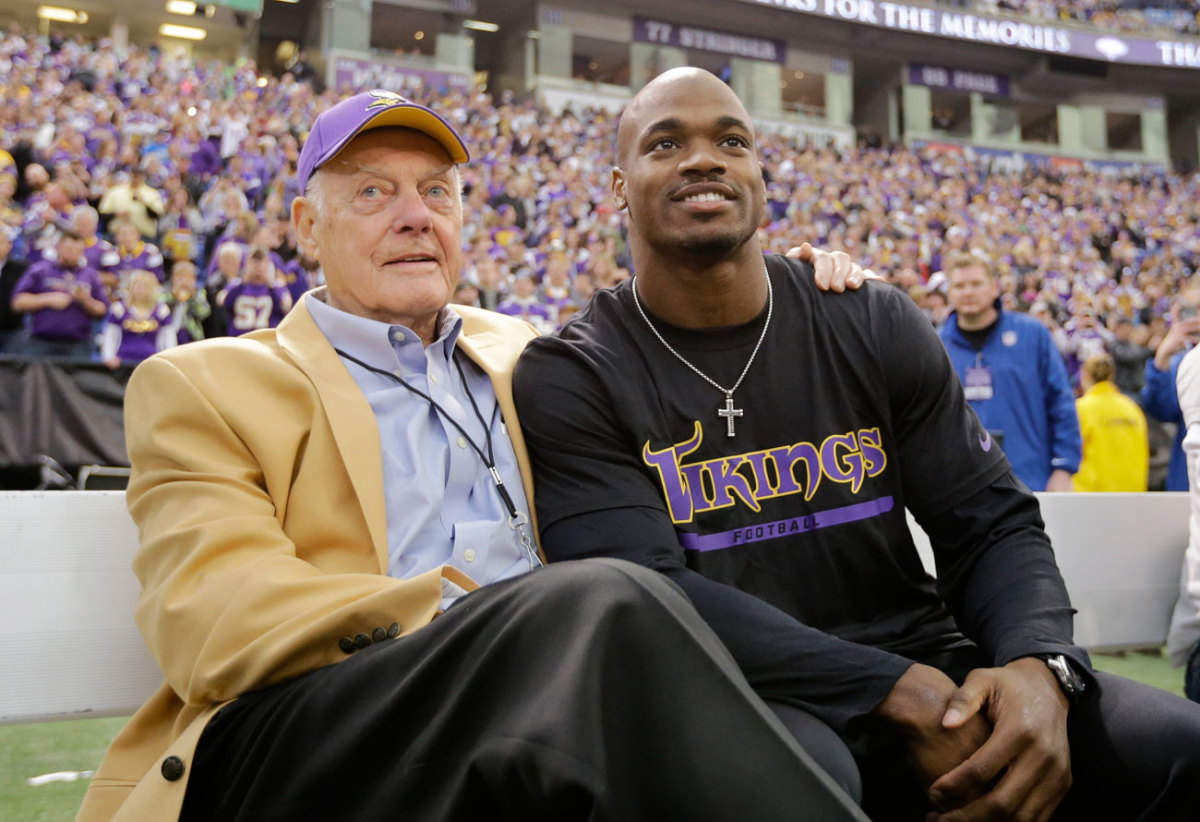
The MMQB: As you know, the big reason they moved the kickoff was after they realized it was the most dangerous play in terms of concussions.
Grant: Then play tag football instead. Football is popular because of the collisions and the tackles and the running and jumping. That’s what the fans come to see; it’s entertainment. It’s not an exercise on how to avoid getting hit. I think there are certain safety measures that take care of the mental part of it, with players not looking to hit somebody in the head. They’ve done that. But let’s not take the entertainment value out of football. I will advocate that, and you can write it, but they are not going to listen to me. I have no stature or clout anymore.
The MMQB: At this point, they can’t make any rule changes that increase the risk of head injury, from a political standpoint.
Grant: Look, I’ve had concussions. I played football and I watched football, all my four boys played football, I’ve got grandsons who play football. My son is a high school football coach. At some point we’re going to have to get to the point where before you play football I’m going to test you at some stage in your life to determine if you’re susceptible to concussions. We need a test that shows us that your brain is situated a certain way that puts you at risk. If you are susceptible, don’t play football. They don’t talk about that, but we’re going to have to come to that point.
I’m not a doctor. All I know is that some guys take a lot of hits and there’s no evidence there’s any residual effect to being concussed, myself being one. I remember being carried off a field. I don’t remember, but I know it happened. Was I concussed? Sure. But maybe I’m not susceptible to the residuals. You remember what I’m telling you, because some day these things will happen and I will be proven right.
* * *
The only locale that might—might—revere Bud Grant more than Minnesota is Winnipeg, where a statue of the coach was erected when the Blue Bombers opened a new stadium in 2014. From Canada, Grant brought an icy stoicism and frosty proclivities—photos of him in short sleeves during Minnesota’s minus-6 degree playoff game this January went viral and added to his legacy.
He also brought from Canada in 1967 a certain degree of disdain for Vince Lombardi, who coached the Packers from 1959 to ’67 and later had the NFL’s crown jewel named after him.
Though seen as a little brother to the increasingly popular NFL, the Canadian Football League enjoyed enough success in the ’50s and ’60s for its teams to offer competitive salaries. That meant wrestling over draft picks and veritable border wars between Canadian teams and northern NFL clubs like the Packers.
The MMQB:I have to hear the Lombardi stories.
Grant: Okay, well, Lombardi and I didn’t get along. He’s a tyrant, and he coached that way. Great coach, but he coached with fear, and he treated everybody—whether you’re the president or the secretary of the club—with bombastic fear. I had three occasions where I dealt with Lombardi.
Lombardi vs. Grant: Round 1
There’s a player from Minnesota who was drafted by Green Bay in 1960 named Mike Wright. He later became the CEO of SuperValu [a Minnesota-based supermarket conglomerate]. I went to the Senior Bowl and signed him. I talked to Mike about coming to Winnipeg. We paid more money—not a lot, but enough. And he could finish his law degree because the CFL dates worked out better. He called Lombardi (who drafted him in the sixth round) and said, “I’m going to Winnipeg.” So Lombardi called me and chewed me out. He said, “Why would he want to play in a Mickey Mouse league like the CFL?!” He was very vulgar and agitated. I said, “Well, I’m sorry, but I’m not sorry. I think it’s in his best interest.” And Lombardi says, ‘Well you no good son of a… blah blah blah.”
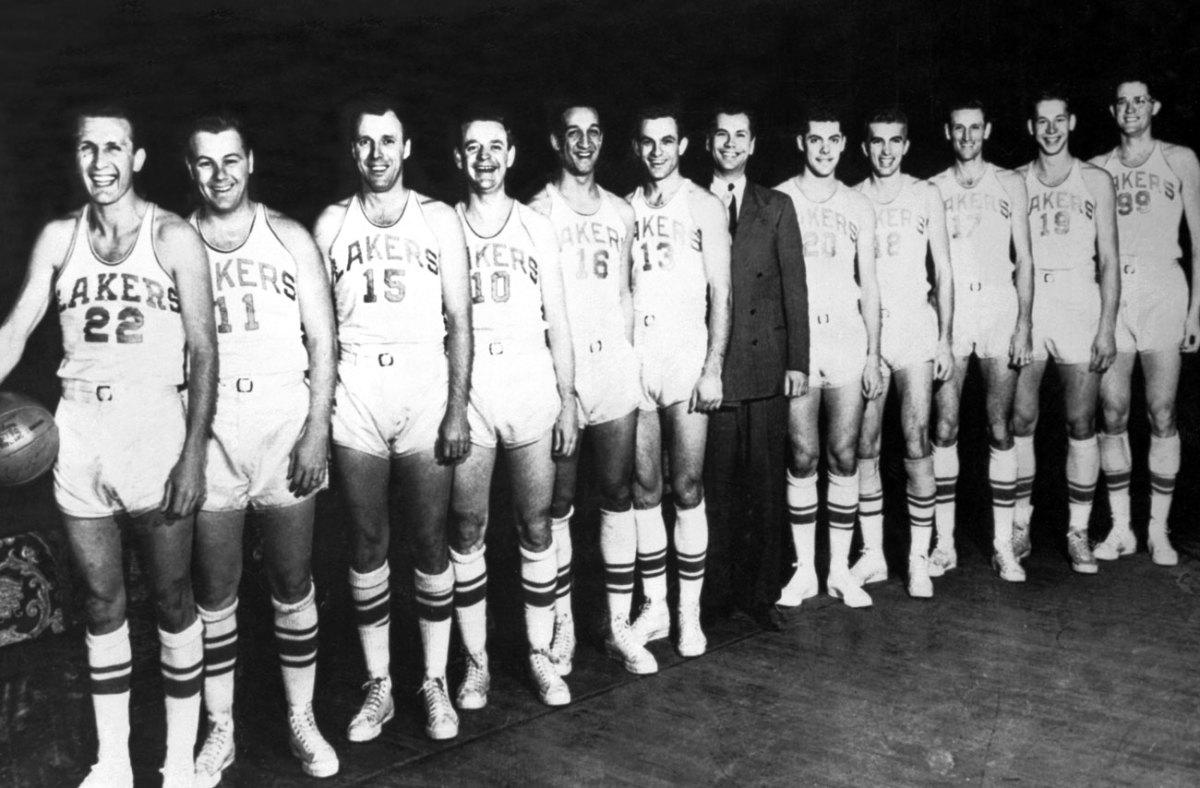
Lombardi vs. Grant: Round 2
Dale Hackbart played quarterback for Wisconsin. And Green Bay drafts him. He’s an independent guy, so he decided he’s going to go play pro baseball. We kept track of him. Of course, in baseball you don’t start at the top, so he played Class D baseball, all the way at the bottom. Baseball has a goofy mentality. It’s like you have to pay your dues, because major league baseball is so elite. So he played in St. Cloud, Grand Forks, Sioux Falls. He played at Winnipeg early in the year, and I went to see him play, and I didn’t see a baseball player in him. I said, “How’s it going?” and he said, “Oh, it’s going great, the guys are fun.” He’s riding the bus, singing songs and all that kind of stuff.
• ROAD TO SUPER BOWL 50: Living the dream at Kurt Warner’s old grocery store in Iowa
A month later he came back to Winnipeg for a series. I saw him at the first game, and he’s hitting about .240, and in that league you have to do better than that. They rained out the second game. Now they’re on the bus going back to Eau Claire. I said, “When did the bus leave?” They said, “Oh, about an hour ago.” So I called the border guys and said, “Stop the bus. Don’t let the bus go through there ’til I get there.” I knew some of the guys down there at customs. So they held up the bus, and I get down there and they’re all sleeping on the bus.
“Dale, get your bag.”
“What for?”
“You’re done playing baseball.”
“Really?”
“Yeah, you’re not gonna make it in baseball. If they won’t tell you, I will. So get your bag. We’re going back to Winnipeg.”
So he took his bag off the bus, went back to Winnipeg, signed the contract. We started earlier, so training camp was right around the corner. Lombardi heard about it and called and said, “I can’t get ahold of Hackbart.” I said, “Well what do you want?” He said, “Get him down here! We drafted him!” I said, “Yeah, but we signed him.” Lombardi went ballistic again. Chewed me out like it was my fault.
Lombardi vs. Grant: Round 3
So the story you probably heard is Fuzzy Thurston. He’s an all-time favorite Packer, and he owned a tavern when he was done. Everybody knew Fuzzy. Before that he played in Cleveland, and I had some friends in Cleveland, and I needed an O-lineman, so they released him, and I called him on the phone right away. He was upset, and I said, “Well Fuzzy, do you want to keep playing?” And he said yes, and I said, “Well, get on a plane and come to Winnipeg. We’ll pay you just as much as Cleveland.” He practiced for a week, and we didn’t have roster room that week, but we were going to activate him for the next ball game. Well, I get a call from Lombardi.
Lombardi: “We’re trying to locate this Thurston guy. Somebody said he’s in Winnipeg, and we can’t get a number for him.”
Grant: “Well, what do you want him for?”
Lombardi: “We got an injury, and we want him.”
Grant: “Well, he’s with us.”
Lombardi: “Oh, for Christ’s sake, who wants to play up there?”
As it turned out the guy who Fuzzy was going to replace was just about well enough that he was going to play that week or the next week. And I hadn’t seen enough of Thurston to make a definitive assessment. So I said, “Vince, is he going to start with you?” Vince said, “Well, Christ, we got a guy down. We need a guy. Just send him down here!” I said, “No, Vince, we’re not your farm club. I’ll tell you what I’ll do—I’ll talk to him.” So Fuzzy said, “I think I can play in the National Football League.”
I called Vince and said, “I talked to Fuzzy, and I’ll give you a number, but first of all we’ve got some expenses up here. We paid his way up here, paid a per diem, so that’s about $500. Plus he’s got a plane ticket, plus—now I was being facetious—we’re acting as his agent, so we’ll need $1,000 total before you get him. I’ll release him when you wire the money. He said, “Well, you no good son of a bitch,” and he went on and on. And he hung up on me. He called back and said, “OK, fine.” The best part of the story is that Fuzzy was one of their all-time great players. I saw Fuzzy a lot after that, and every time he saw me he would give me a big hug.
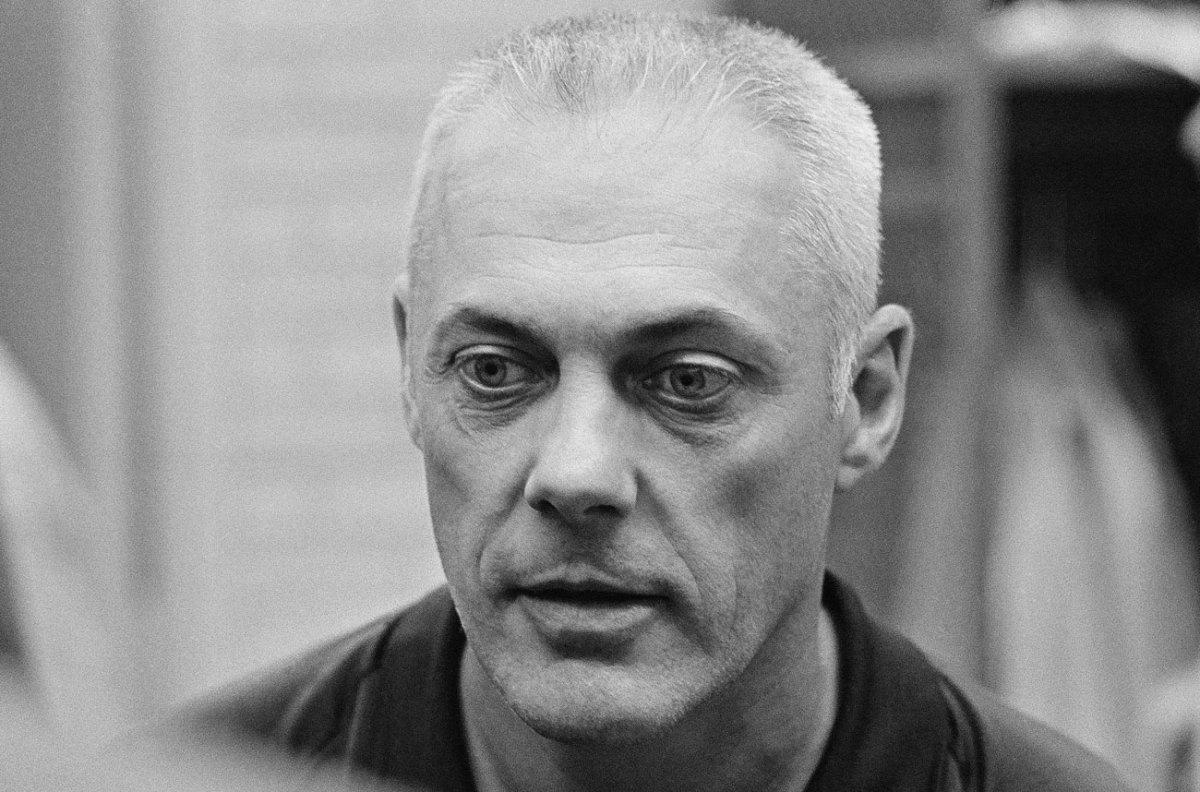
Lombardi vs. Grant: Round 4.
So my first year with the Vikings, the first game I ever won as an NFL coach, was against the defending champion Packers in Milwaukee. We beat them in a very close game, and I think we only threw for about 80 yards, played good defense, ran the ball, got a couple breaks and won. After the game we’re walking off the field. I’ve always shaken hands after games, but your heart’s not in it. It’s a ceremony. So I put my hand out, and he wouldn’t even shake hands with me. And that was the last time I ever talked to him.
• Question or comment? Email us at talkback@themmqb.com.
